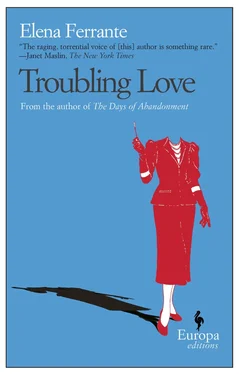I checked the clock: it was ten after six. To keep Caserta from forcing me again to listen to his silence, I picked up the receiver and dialed Uncle Filippo’s number. I was prepared for the long sound of the rings. Instead he answered, but without enthusiasm, as if annoyed by the fact that it was me. He said that he had just come in, that he was tired and cold, that he wanted to go to bed. He coughed artificially. He mentioned Caserta only when I asked, and then was irritated. He said they had talked for a long time but without quarreling. They had suddenly realized that there was no longer any reason for it. Amalia was dead, life had moved on.
He was silent for a moment, to let me speak: he expected some reaction. I had none. So he started muttering about old age, about solitude. He said that Caserta had been thrown out of the house by his son, had been left on his own, just like that, without a roof, worse than a dog. First the boy had stolen all the money he had saved and then had thrown him out. His only good fortune had been Amalia’s kindness. Caserta had confided to him that they had seen each other again after many years: she had helped him, they had kept each other company, but discreetly, with mutual respect. Now he lived like a tramp, a little here, a little there. These were things that not even someone like him deserved.
“A fine man,” I commented.
Filippo became even colder.
“There comes a time when one has to make peace with one’s neighbor.”
“And the girl on the funicular?” I asked.
My uncle was embarrassed.
“Sometimes it happens,” he said. I didn’t know it yet but I, too, would find out that old age is a brute, ferocious beast. Then he added: “There’s worse foolishness than that.” Finally he said, with uncontrolled bitterness:
“Between him and Amalia there was never anything.”
“Maybe it’s true,” I admitted.
He raised his voice.
“Then why did you tell us those things?”
I retorted:
“Why did you believe me?”
“You were five years old.”
“Exactly.”
My Uncle Filippo sniffed. He murmured:
“Go away. Forget it.”
“Take care of yourself,” I advised him and hung up.
I stared at the telephone for a few seconds. I knew that it would ring: somewhere Caserta was waiting for the line to be free. The first ring was not long in coming. I made up my mind and left quickly, without locking the door.
There were no more clouds, there was no more wind. A whitish light reduced the Arciconfraternita di Santa Maria delle Grazie, tiny between the transparent façades of ordinary buildings covered with advertisements. I headed toward the taxis, then changed my mind and went into the yellow building where the subway entrance was. The crowd rustled beside me as if it were made of paper cutouts intended to amuse children. The sound of obscenities uttered in dialect — the only obscenities that could fit together sound and sense in my head in such a way as to make concrete a sex that was troublesome in its aggressive, pleasure-seeking, and sticky realism: every other formula outside of that dialect seemed to me insignificant, often lighthearted, pronounceable without repulsion — softened in an unexpected way, becoming a kind of rustling against the roller of an old typewriter. As I descended into the underground at Piazza Cavour, a warm wind blew in, making the metallic walls sway and mixing the red and blue of the escalator, and I imagined I was a figure from Neapolitan cards: the eight of spades, the woman who, calm and armed, advances on foot ready to jump into the game of briscola . I bit my lips between my teeth until they hurt.
The whole way I kept looking behind me. I couldn’t see Caserta. To get a better view of the half-empty areas of the platform between the two black holes of the tunnel, I mingled where the crowd of waiting passengers was thickest. The train was full but emptied out soon afterward, in the neon half-light of the station at Piazza Garibaldi. I got out at the end of the line and, after a short set of steps, found myself beside the old cigarette factory, on the edge of the neighborhood where I had grown up.
The rural feeling it had had, with its four-story white buildings constructed in the middle of the dusty countryside, had been transformed over the years, and it had become a jaundiced neighborhood of the periphery, dominated by skyscrapers, choked by traffic and by the trains that, slowing down, snaked alongside the buildings. I turned immediately to the left, toward an overpass with three tunnels that went under it, the middle one closed by reconstruction work. I recalled a single endless passage, deserted and constantly shaken by the trains on the siding overhead. Instead I took no more than a hundred steps, slowly, in a shadowy light stinking of urine, squeezed between a wall that sweated large drops of water and a dusty guardrail that protected me from the crowded automobile lane.
The overpass had been there since Amalia was sixteen. She had had to walk through those cool shady tunnels when she went to deliver the gloves. I had always imagined that she carried them into the space I was leaving behind me, to an old factory with a tile roof that now displayed a Peugeot sign. But surely it wasn’t like that. But what was like that? There was no longer any gesture or step there that, though the stones and the shadows were the same, could help me. Amalia had been followed in the tunnel by peddlers, railway workers, idlers, stonemasons chewing on rolls stuffed with broccoli and sausage or drinking wine from flasks. She told us, when she felt like telling us, that they stayed close, at her side, often breathing in her ear. They tried to touch her hair, her shoulder, her arm. Some tried to take her hand while making obscene remarks. She kept her eyes down and walked faster. Sometimes she burst out laughing, unable to contain herself. Then she would start running faster than her pursuer. How she ran: as if she were playing. She ran in my head. Was it possible that I, passing through there, carried her in my aging, unsuitably dressed body? Was it possible that her sixteen-year-old body, in a homemade flowered dress, was passing through the shadowy light by means of mine, nimbly avoiding the puddles, as she hurried toward the arc of yellow light that contained the anachronism of a Mobil gas pump?
Maybe, in the end, all that mattered of these two days without respite was the transplanting of the story from one head to the other, like a healthy organ that my mother had given up to me out of affection. My father, too, barely twenty, had chased her on that stretch of road. Amalia told us that, hearing him behind her, she was frightened. He wasn’t like the others, who talked about her, trying to win her over. He talked about himself: he boasted of the extraordinary things he was capable of: he said he wanted to make a portrait of her, perhaps to prove to her how beautiful she was and how talented he was. He alluded to the colors she wore. How many words vanished who could say where. My mother, who never looked any of her pursuers in the face and while they talked made an effort not to laugh, told us that she had glanced at him sideways just once and had immediately understood. We, her daughters, did not understand. We couldn’t understand why she liked him. Our father did not appear to us at all exceptional, slovenly as he was, fat, bald, unwashed, his sagging pants smeared with paint, always grumbling about the miseries of every day, about the money that he earned and that — he yelled at us — Amalia threw out the window. Yet it was that man without a job whom our mother had asked to come to her house if he wanted to talk to her: she wouldn’t make love in secret; she had never done so. And when she uttered the words “make love” I listened openmouthed, I liked the story of that moment so much, without its sequel, stopped before it could continue and be ruined. I preserved the sounds and images. Maybe now I had come to that underpass so that the sounds and images would coalesce again among the rocks and shadows, and again my mother, before she became my mother, was followed by the man with whom she would make love, who would cover her with his name, who would annihilate her with his alphabet.
Читать дальше












